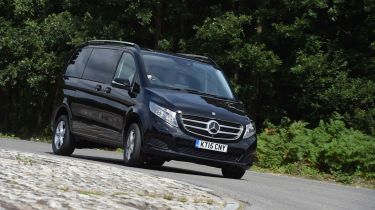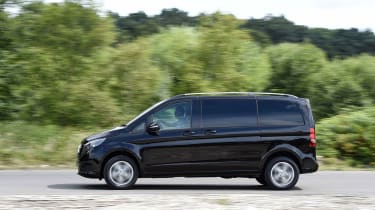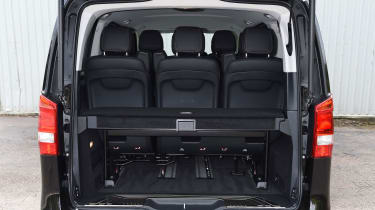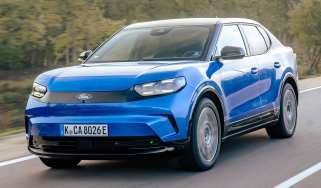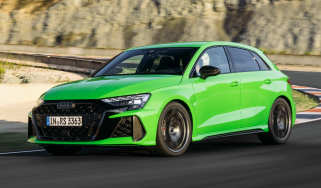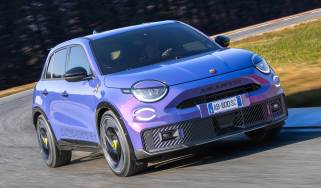Mercedes V250 2015 review
Lots of practicality and luxury mean the Mercedes V250 is one of the best upmarket MPVs on sale – but it comes at a price
The new Mercedes V-Class with top-spec 250 Bluetec diesel engine is about as upmarket as super-spacious people carriers come, but there’s still no getting away from the V-Class’ van-based roots, as niggling refinement issues spoil the premium image.
When a plain old people carrier just isn’t large enough to carry you and a group of friends or family around, it’s cars like the new Mercedes-Benz V-Class that come into their own. This 2015 V250 Bluetec SE blends typical Merc luxury with a cavernous interior that offers a different level of business class comfort to a regular high-end saloon – and we’ve driven it for the first time in the UK.
Although there’s a lot on offer, straight away the V250 has a big hurdle to overcome, as the Mercedes costs a significant £43,520. With a light smattering of options (including an around view camera system, Mercedes’ Driving Assistance Package to boost safety and an upgraded Burmester hi-fi) our test car came in at £48,265. But there’s no smooth, purring V6 under the bonnet like in the brand’s S-Class limo – instead, the 2.1-litre four-cylinder turbodiesel in this V-Class is the top of the range unit.
More reviews
In-depth reviews
Road tests
The engine makes 187bhp, which is a strong output even in a 2,105kg car, so there’s plenty of performance on tap with 0-62mph taking 9.1 seconds. However, put your foot to the floor and the acceleration is accompanied by an unwelcome diesel drone.
With a useful 440Nm of torque available from as low down as 1,400rpm – as much as the older 3.0-litre V6 diesel it replaced – it’s better to coax the V-Class along more gently so the seven-speed automatic gearbox doesn’t kick down and pump more clatter into the cabin. It’s not the quickest transmission, but the shifts are smooth and help to give a relaxed driving experience. The engine also feels impressively muscular if you drive the V250 this way, and it helps ease the refinement issues to some degree, too. At motorway speeds the noise is far less intrusive.
The V-Class also gets some standard features you’d expect to see on more expensive sports cars. By taking the big Mercedes out of Efficiency mode and slotting it into Sport or Comfort as part of the Agility Select function there’s an extra 13bhp and 40Nm on top to help with overtaking. The Agility Control suspension, meanwhile, adjusts the ride depending on the mode selected.
There’s still no getting away from the V-Class’ roots though. Sharing its chassis with the Mercedes Vito commercial vehicle, the V250’s slow steering and upright driving position mean it still feels more like a van than a car to drive. And although the lavish, leather-lined interior is much more sumptuous than the bare metal load bay of its stablemate, the V-Class’ suspension never quite settles down over rippled roads, sending a shimmy through the body that shook and rattled trim parts in our test car. You can drown it out with the thumping 15-speaker stereo, but it’s a frustrating trait in a vehicle costing nearly £50,000.
However, things do get better, as when you load the Mercedes up with people and luggage, the extra weight calms the ride down and the car floats more serenely over bumps. The disconnect between the plush damping at the front end and the harsher rear axle set-up never quite disappears completely but on smoother roads and motorways it’s a comfortable car to drive or ride in, with the classy interior and lavish seats cosseting you nicely.
Our test car came in standard wheelbase form, but there’s also a long wheelbase model if you want even more room. With our car’s seven-seat configuration, there’s plenty of room for all passengers in the regular variant but there’s also an eight-seat option available for the long wheelbase model that turns the individual middle-row chairs into another three-seat bench like the one in the third row. A folding table comes as standard in the 7-seater, too, which comes in handy if you arrange the chairs in a ‘lounge’ formation facing each other.
With twin electric sliding doors, access to the rear is easy. However, boot space is fairly limited. There’s a total of 610 litres available depending on how the seats are configured, but if you maximise legroom there won’t be much room for luggage behind the third row of seats.
A split tailgate with a power close feature adds a bit more practicality and storage is good. You get seat nets, big door bins with double height trays in the front, and a huge central cubby boasting two cupholders.
Up front the dashboard design is similar to many of Mercedes’ passenger cars, with an optional 8.4-inch tablet-style multimedia screen sitting in the middle here, and round air vents and the climate controls surrounding it. Sat-nav comes as standard, as does Bluetooth, Active Park Assist with a reversing camera, cruise control, heated leather seats and Sidewind Assist. Given the V-Class’ vast proportions and slabby sides, this should help to reduce the effect of crosswinds, while the parking sensors and a reversing camera make it that bit easier to manoeuvre.
Stop-start is also on the kit list, which helps to push combined fuel economy up to a claimed 44.8mpg and CO2 emissions down to 166g/km. This will help put the V-Class on the radar of private hire businesses that use cars like these to chauffeur clients as well as private buyers looking for something a little more than a conventional MPV.
The Mercedes can certainly cut-it as business transport, with a luxurious interior, lots of kit, competitive efficiency and a versatile seating arrangement. The slightly fidgety ride and high price tag are the only question marks over the V-Class, but it’s a problem that affects rivals, too. VW’s less stylish Caravelle Business is even more expensive at £57,305, which makes the Mercedes look like relatively good value.

